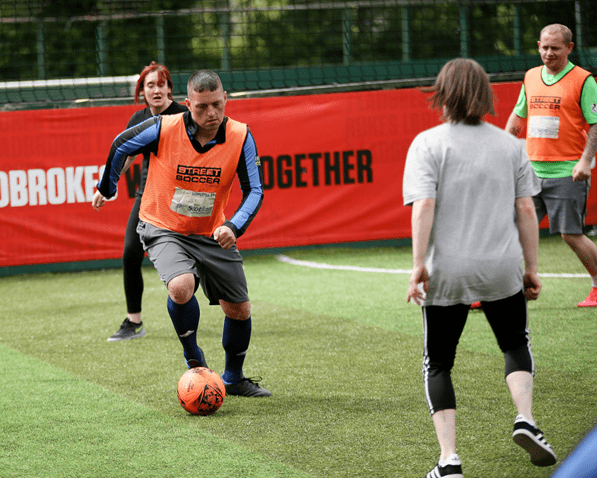How we’re using restorative practices to reach our goal of helping communities through street soccer

What does Street Soccer Scotland do and what programmes does it offer to communities across Scotland?
We provide free football and support for players from disadvantaged backgrounds aged from 12-16 (youths) and 16+ (adults) males and females in 11 towns/cities across Scotland, delivering 60 + sessions per week. For adults, we offer a basic drop in session where people can come along and join in. In addition to the drop ins, we offer other programmes and opportunities to engage the players in positive activities such as Street45 (women`s only Zumba, boxercise, boot camp as well as football), additional support needs sessions, walking football, local and national tournaments, Team Scotland for the Homeless World Cup, prisons (inside and out), education (our own SCQF (Scottish Credit and Qualifications Framework) accredited modules), and network sessions (working with partners in smaller towns and areas). Our youth programme is delivered in areas of multiple depravation, schools targeting disengaged young people, youths in criminal justice system, care-experienced young people. Around 60% of our staff have lived experience and can therefore relate and empathise with the players and their backgrounds. Sessions are 30% about the football and 70% about player engagement and structure, to enable participants to make positive choices in their lives.
The organisation emphasises inclusivity, non-judgment, and opportunities for all. How do restorative practices align with these principles?
Over the years we have created, developed and introduced new programmes based on the needs of our players which I realise now links to restorative practice. Once a year we hold a census of all our players which is anonymous and allows them to not only provide details of their background but to express their opinion on Street Soccer programmes and methods too. This allows us to evaluate the effectiveness of our programmes and amend accordingly. Many players over the years have said that street soccer is like a family, as a result of the relationship built up with the staff and others this is grown out of the non-judgemental approach used by the staff.

What motivated you to attend the workshop organised by Community Justice Scotland with Dr Ian Marder and what valuable insights did you gain that you believe are relevant to Street Soccer Scotland’s work?
I had read about restorative justice but I struggled to understand how we could implement it in our programmes. However when I read that this was about restorative practices I was keen to understand more and establish how we could use them in our programmes and interactions with the players.
How do you plan to apply what you’ve learned, and what outcomes or changes do you hope to achieve?
I feel that many of our methods already use restorative practices by involving the players’ needs into the development and growth of our programmes. As we are a relatively small organisation this enables us to be very responsive to the players’ needs. In future, we will make a more conscious effort to involve the players and our network of partners in working parties to discuss possibilities and developments of new initiatives.
As the organisation continues to grow and expand its reach, how do you envision restorative practices helping to achieve its goals?
The concept of our network programme is to engage with local social sector organisations active in their areas to establish a foothold in each area in order to make sessions sustainable by training and developing local players to run the sessions with ad hoc support from our staff. I see the concept of restorative practices as a key way of working in the communities and engaging local support to grow the programmes. We have established that one size does not fit all when you are setting up a new session, therefore it is key that we understand the issues in each area by involving the local community in providing ideas and guidance as to where and how we can have the most positive impact.
If you are interested in supporting or getting involved with Street Soccer Scotland please contact Andy Hook on andy@streetsoccerscotland.org
